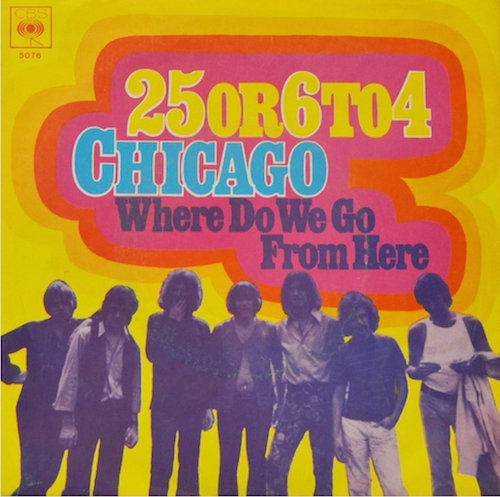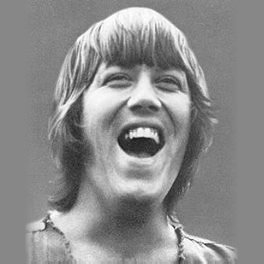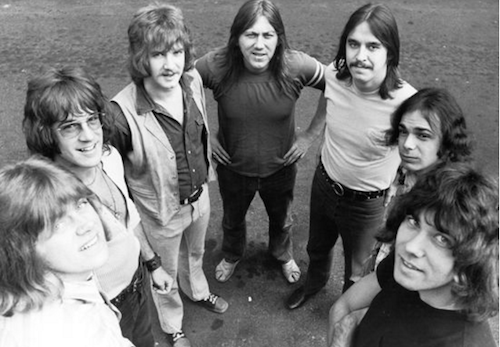
By the time Chicago had their first #1 single in 1976, “If You Leave Me Now,” they were a far different band from their early days. Although their hits from that mid-1970s era onward were, by any measure, well-crafted pop songs—middle of the road, as the phrase went in those days—Chicago had left behind the horn-powered, soul-infused innovation of their earliest days.
And they were very far removed from the music heard on “25 or 6 to 4,” recorded live at Tanglewood in Lenox, Mass., on July 21, 1970. Watch our Classic Video and you will witness one of the hardest rocking bands of its time. It’s actually difficult to imagine that this is the same band that cut those later hits.
In fairness, they weren’t quite the same. As you watch this seven-minute performance of “25 or 6 to 4,” take note of what happens just before the three-minute mark. Terry Kath, the group’s guitarist, tears into a two-and-a-half-minute solo that has to rank among the most insane of the era. He’s so numbingly good that Jimi Hendrix reportedly stated that Kath was a better player than he was.
To understand how Chicago became what it did, it’s informative to know where they came from. They formed in 1967 as Chicago Transit Authority, with guitarist/singer Kath, keyboardist/singer Robert Lamm, bassist/singer Peter Cetera, saxophonist Walter Parazaider, trumpeter Lee Loughnane, trombonist James Pankow and drummer Danny Seraphine. Signed to Columbia Records in 1968, they released their self-titled debut album the following spring. The group, which happened to come around at a time when rock bands were beginning to incorporate horn sections—Blood, Sweat and Tears and the Electric Flag were two others—took off quickly. The album reached #17.

Two singles culled from the James William Guercio-produced album, “Does Anybody Really Know What Time it Is?” and “Beginnings,” reached the top 10 in 1970 and ’71, respectively, but by that time the group had shortened its name to Chicago and released its second LP, another double, this one simply titled Chicago. (From that point onward, most of their albums, for the rest of their career, would be titled with consecutive Roman numerals—at last count they were up to Chicago XXXVIII in 2022 with Born for This Moment.)
Like its predecessor, Chicago struck a balance between soul, hard rock, ballads and what might be called nascent jazz fusion, although its centerpiece was the 13-minute suite “Ballet for a Girl in Buchannon.” From that, the undeniably catchy “Make Me Smile,” written by Pankow and sung by Kath, became Chicago’s first top 10 hit in 1970, but it was the followup, “25 or 6 to 4,” written by Lamm and sung by Cetera, that showed their ability to rock as hard as anyone else on the scene. It reached #4 in the summer of ’70, the period seen on our Classic Video.
So what exactly was “25 or 6 to 4” about? Who knows?! In its time, there was speculation that the “25” part of the title was a reference to LSD, whose full pharmaceutical name was LSD-25. The “6 to 4” was said to be a ratio involved in the manufacture of the drug. Lamm laughed off those suggestions, stating that it was simply inspired by a time of day: 25 or perhaps 26 minutes before 4 o’clock.
Still, with lyrics such as these, one can understand where some listeners might have come up with the idea that it was about an acid trip:
“Should have tried to do some more
Twenty five or six to four, oh yeah
Feeling like I ought to sleep
Spinning room is sinking deep
Searching for something to say
Waiting for the break of day, ohh”

As early as Chicago III—the first of the numbered albums—the band began losing its original driving focus but its increasingly mainstream sound benefited Chicago commercially. “Saturday in the Park,” in 1972, was the last gasp from the original Chicago before they morphed entirely into a more disciplined pop outfit.
They continued to release an album per year and had recently put out Chicago XI when tragedy struck. On January 23, 1978, Kath was in California at a party when he began playing around with guns. Although he was an experienced gun user, he did not know that the pistol in his hand had one round in its chamber. Kath pointed the gun at his head, pulled the trigger and died instantly. He left behind a wife and young daughter.
Chicago briefly considered quitting, but they soldiered on, replacing Kath on the dance music-oriented Hot Streets (before returning to numbers on their next album) with guitarist Donnie Dacus. Chicago is still an ongoing outfit today, with four original members still on board: Lamm, Loughnane, Pankow and Parazaider. They were inducted into the Rock and Roll Hall of Fame in 2016.
Related: Chicago at their Rock and Roll of Fame induction
If they ever had a more incendiary moment than this one from 1970 though, we haven’t seen it.
Our Classic Video…
Related: Our Album Rewind of Chicago’s eclectic debut album


13 Comments
You like solo?! Head to YouTube and hear Poem 58!
No better group. Bar none. They rocked it and they cooked like nobody else could.
hi, would you happen to know which musicians played in chicago 18’s 1986 version of ’25 or 6 to 4′? thanks.
What a sad thing to lose Terry Kath. He was a monster guitarist. And Hendrix was right: Kath was better.
I guess “better” is a matter of taste. But yeah, Kath’s guitar work is incredible. His live performance on this version tops the studio recording. What really strikes me is his impeccable sense of rhythm, which Hendrix also possessed.
He was a monster. Very underrated.
I always found Chicago to be a bit of a confusing band, in that, as this article says CTA came out with guns blazing — a driving musical force with three solid lead vocalists, and interesting songs that took rock music in new directions. Then, I guess partly due to Kath’s death, they turned into this namby-pamby pablum band, that, sure, became a plastered fixture on the radio, but no longer created music that I wanted anything to do with. I don’t know why they couldn’t maintain their edge and still have their hits. Perhaps the sould of the band was Kath, after all, as others have maintained.
Not unlike the origin Blood Sweet and Tears. The later version was too MOR in my estimation. but they sure made money. Always the measure of a great band in some circles. Not my circle however.
@Da Mick
Sadly, the same thing happened to Charlie Daniels.
When Chicago (as well as all of us music lovers) lost Terry Kath, Chicago lost it’s soul, as well as it’s edge.
While Chicago, since it’s inception, up to to that point, steadfastly maintained, and demonstrated, that they were a BAND, and everyone contributed.
After Terry Kath left this earth, Chicago (IMHO) lost their rock spirit, and Peter Cetera became The Show, instead of the bassist and vocalist. Cetera is a very good tenor and decent bassist, but he wanted the limelight, and got it, thanks to – wait for it- the entrance of David Foster.
Don’t even get me started on David Foster.
While acknowledging he is a brilliant producer and promoter, he was (and still is) more interested in pop success, rather than artistic achievement, and pushed the supremely talented and innovative horn section to the background, along with their song writing skills and contributions.
The addition of Bill Champlin was necessary at the time, to revive Chicago’s vocals, but again, emphasis on pop.
One redeeming virtue, however, is if you have been to a Chicago concert in recent years (even though the original line-up has dwindled), there is a major emphasis on playing the late 60s to mid-70s classics and gems, and they still do them with joy and skillful execution.
It’s still not too late.- Peter Cetera and Danny Seraphine are still alive and performing.
With Keith Howland, they have a good guitarist, so while it is unlikely, it would be nice to see a “true” reunion tour, before it is too late.
For the fans of Chicago, all would be forgiven……………(Just keep David Foster as far away as possible )
This song is about trying to write a song. It was written above a club where the neon lights were flashing and the words just wouldn’t come. 25 or 6 to 4 is the time as in 25 or 26 minutes to 4:00 AM. It was explained as this being the meaning of the song in the DVD “Now More Than Ever: The History Of Chicago”
Someone once said that “Terry would never play one note when two would do”. Damn right!
Yes, sans Kath Chicago transformed into another band. I would also argue that a transformation took place when they jettisoned James William Guercio as producer. Beyond the business issues, JWG had proven production chops, not only with Chicago but The Association and Blood, Sweat and Tears.